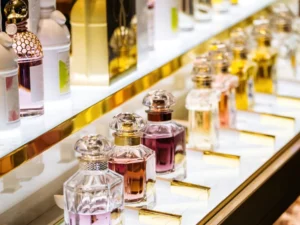Before starting any business, you naturally consider its potential for success, sustainability, and the challenges you might face. The biggest question is: Is it profitable? The same applies if you’re thinking about entering the perfume trade—especially given the intense competition and market fluctuations.
That’s why we created this article to help you make an informed decision. We’ll answer whether the perfume business is successful, is selling Perfume Profitable, address other key questions on your mind, and explain how our factory, Jasmine, can support your success and growth once you decide to get started.
Is selling Perfume Profitable?
While the perfume industry offers promising opportunities, your success depends on a deep understanding of its market and characteristics.
Simply put, there are key facts you should know before launching your venture.
Target Market
Identifying the audience you want to reach is the foundation of any perfume business. Are they luxury fragrance lovers, budget-conscious buyers, or fans of natural scents? Your answer will shape your product range, pricing strategy, and marketing channels.
Differentiation vs. Innovation
In a competitive market, offering just a perfume isn’t enough. Success hinges on presenting a unique formula, a compelling brand story, or an innovative marketing concept that grabs customers’ attention and builds loyalty. Continuous innovation in design and scent is essential to stand out.
Production & Distribution Costs
Starting a perfume business requires investment in R&D, sourcing high-quality raw materials, and manufacturing and packaging processes. You also need a clear distribution plan—whether through physical stores or online platforms—to ensure your products reach the intended customers.
Effective Marketing & Digital Presence
Even the finest perfumes won’t succeed without well-planned marketing. Focus on building your brand story, leveraging social media to showcase your products, and engaging your audience. Influencer marketing and collaborations with fragrance bloggers can boost your reach and attract buyers.
Compliance with Industry Regulations & Standards
The perfume industry is governed by strict rules covering ingredients, production processes, and labeling. Adhering to international and local standards is crucial for product quality and consumer safety, and it helps build a strong, trustworthy brand reputation.
High-Profit Margins
Especially when focusing on high-quality or niche perfumes. Initial production or import costs can be reasonable compared to the final retail price, opening the door for attractive returns when selling at competitive prices.
Diverse Sales & Marketing Channels
From traditional retail stores to digital platforms and social media, mastering your presence across these channels lets you reach a wide customer base. Building a strong brand and sharing it with your target audience significantly increases your chances of success.
Market Size & Variety
The perfume market is global and vast, characterized by extreme diversity to suit all tastes and budgets—from luxury and everyday perfumes to niche scents. This offers ample room for innovators and entrepreneurs to carve out their space. Targeting and focusing on a specific segment greatly improves your success potential.
Cultural Impact & Marketing
Cultural differences directly influence fragrance preferences, like high demand for oud in the Middle East or lighter scents in Europe. This calls for careful market research. Combining this understanding with innovative digital marketing enhances your customer reach and is key to success.
The perfume industry holds valuable investment opportunities for those seeking distinction and profitability. To make the most of it, visit our Jasmine website and explore our exclusive collection.
ِAlso read: How to Build a Successful Private-Label Car Air Freshener Business 2025?

How Profitable is Perfyume Trade?
Evaluating the financial viability of any business requires a close look at the numbers and market dynamics.
So let’s explore what makes the perfume trade profitable and uncover its true margins.
Strong Consumer Demand
Perfumes are products with both consistent and seasonal demand. People are always seeking fragrances that reflect their personality or make valuable gifts. This steady demand ensures ongoing sales and strengthens your chances of profitability.
Production Costs vs. Retail Price
In many cases, the cost of producing a bottle of perfume is significantly lower than its retail price. The substantial gap between cost and final price allows for excellent profit margins—especially when combined with effective marketing strategies.
Strategic Pricing Approaches
Setting a retail price isn’t just about adding a flat markup. You need to consider competitor pricing, perceived product value, and your specific target audience. Strategic pricing attracts more customers while maintaining a healthy profit margin.
Variety in Price Points
Perfume products range from affordable everyday scents to luxury and rare fragrances. This variety allows you to target different consumer segments and sell at multiple price levels—broadening your market and increasing overall profit potential.
Marketing and Distribution Channels
Marketing and distribution costs directly impact your final profit margin. Whether selling online, through retail stores, or via distributors, each channel comes with unique expenses. Choosing cost-effective, high-reach channels can significantly boost your net revenue.
Sales Volume and Its Impact
There’s a direct relationship between sales volume and profit margin. As the number of units sold increases, the cost per unit drops—raising your overall profitability. Building a loyal customer base and encouraging repeat purchases helps sustain long-term earnings.
Perfume trading can be highly profitable when costs are managed wisely and strategic pricing and marketing are in place. Be part of Jasmine’s success—contact our team and benefit from our expertise to launch strong and grow sustainably.
Also read: How to Become an Authorized Wholesale Perfume Agent?
The Future of Perfume Trading
Though rooted in tradition, the perfume industry has proven its ability to adapt and grow—even as global markets evolve at a rapid pace. How? Here’s what you need to know:
- Innovation in Ingredients and Manufacturing: Innovation opens the door to creating unique, sustainable fragrances that align with consumer demand for authenticity and environmental responsibility. Brands embracing this direction are strengthening their leadership in the market.
- The Rise of E-Commerce: Online platforms have made it easier for perfume products to reach global audiences. Even smaller brands can now build international presence without massive physical investments. This digital shift expands your customer base and enhances your potential for growth and profitability.
- Sustainability and Social Responsibility: Today’s consumers care about ethical practices and sustainability. This has led to growing demand for natural and eco-friendly perfumes. Embracing these values not only improves your brand image but also attracts environmentally conscious customers.
- Personalization and Tailored Experiences: The market is shifting toward more personalized experiences—like custom fragrance creation or tailored sample kits. This approach deepens the customer’s connection to your brand and makes the buying process more engaging, opening up exciting opportunities for growth and innovation.
The perfume trade offers abundant opportunities for those with vision and the ability to adapt to market trends. Discover how Jasmine can help you seize these opportunities and launch a successful perfume business.
Also read: Perfume Industry: How technology Transform the Perfume Business?

Pros and Cons of Starting a Perfume Business
Like any business venture, entering the perfume market comes with a mix of advantages and challenges that you need to understand before getting started. So, what should you expect?
Pros
- High-Profit Margins: Perfumes carry emotional and aesthetic value, which allows them to be sold at attractive prices. The cost of producing a single bottle is often much lower than its retail price, offering plenty of room for healthy profits.
- Consistent and Growing Demand: Perfumes enjoy steady and increasing consumer demand. People are always looking to enhance their appeal or gift something unique. The market continues to grow thanks to rising beauty awareness and global fashion trends.
- Easy to Store and Ship: Perfume products are small and lightweight, making them easy to store and transport without special requirements. Shipping is simple and cost-effective, reducing logistics costs and improving operational efficiency.
- Scalability and Product Variety: You can start with a small perfume collection and gradually expand by adding new products like oil-based scents, sprays, or even skincare lines. This variety creates multiple growth opportunities and helps you reach broader customer segments.
Cons
- Intense Market Competition: The perfume industry is crowded with many brands, creating fierce competition. To stand out, you’ll need a strong marketing effort, a unique brand identity, and exceptional product quality to attract and retain customers.
- Need for Initial Capital: Launching a perfume business requires investment in R&D, ingredients, packaging design, and manufacturing. Having enough capital for production and marketing is essential to enter the market with confidence and compete effectively.
- Shifting Consumer Preferences: Fragrance trends change quickly. To stay relevant, you must keep up with evolving tastes and continuously introduce new scents. Failing to adapt can lead to slow sales and excess inventory.
- Challenges of Differentiation and Imitation: In a saturated market, it’s difficult to make your fragrance stand out—especially with the rise of knockoffs. Protecting your intellectual property and creating distinctive scents is crucial for maintaining market share and building customer loyalty.
At Jasmine, we stand by your side to help you overcome these challenges and launch products that bring you the profits you deserve. Reach out to our expert team and let’s get started.
Also read: Pros and Cons of Perfume Trade: Is It the Right Business for You?

Jasmine: Your Ideal Partner for Success in the Perfume and Fragrance Business
Achieving distinction in the perfume and fragrance market requires specialized support and a strong partnership. At Jasmine, we offer comprehensive solutions to help you reach the success you aspire to:
- Complete Brand Support: We assist you in building a strong and unique brand identity—from packaging design to marketing strategies.
- Exceptional Manufacturing Quality: We guarantee premium fragrance products that meet the highest international standards and exceed your customers’ expectations.
- Flexible Production Options: Whether you need small test batches or large-scale production for expansion, our manufacturing is tailored to your needs.
- Wide Range of Products and Scents: Choose from our extensive collection of perfumes and fragrance products—or work with us to develop custom scents exclusive to your brand.
- Efficient Logistics Solutions: We simplify storage, handling, and shipping processes, ensuring your products reach customers quickly and reliably.
- Trend-Driven Market Insight: We keep you up to date with the latest industry trends, helping you launch innovative, fashion-forward products that stay ahead of the market.
With Jasmine by your side, you’re equipped with everything you need to build a profitable and standout fragrance business.
Also read: Color Psychology in Packaging: How to choose Selling Colors
FAQs About Starting a Perfume Business
How much capital is needed to start a perfume business?
The required capital depends on the scale of your project. A small online perfume business may only need a few thousand dollars to cover initial stock and digital marketing. On the other hand, opening a physical store involves larger investments in rent, interior design, and inventory.
Is a perfume business profitable?
Yes, the perfume business can be highly profitable due to its strong profit margins. Continuous demand and product variety contribute to healthy returns—especially when paired with effective marketing and a strong brand identity.
Is starting a perfume business expensive?
It can be, particularly if you’re planning a luxury retail store with high-end design and large inventory. However, the cost drops significantly if you start as an online store or small home-based business, giving you greater control over startup expenses.
What are the steps to open a perfume shop?
Start by defining your business concept and selecting your product range. Then register your business and secure the necessary licenses. Next, find reliable suppliers and design your store—whether physical or online—before launching a strong marketing plan.
What do you need to set up a perfume shop?
Essential items include display fixtures, proper lighting to highlight products, a point-of-sale (POS) system, a diverse selection of perfumes, packaging materials, and tester samples for customers.